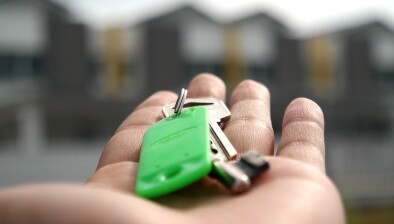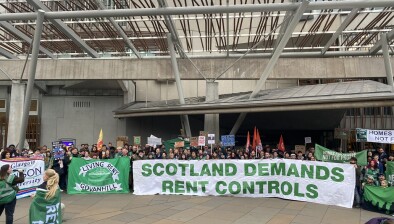Unions urge Scottish Government to stand firm on rent controls

Housing Secretary Màiri McAllan
The Scottish Government needs to resist calls from landlords to introduce exemptions to the housing bill and commit to strong and robust rent controls that protect tenants, tenants’ and trade unions have said.
Tenants’ union Living Rent, along with the Scottish Trade Union Congress, Unite, GMB, UCU, the RMT and PCS, have hit out at the government’s ongoing consultation on exemptions to the Housing Bill by sending an open letter addressed to First Minister John Swinney and new Housing Secretary Màiri McAllan.
An open letter calls for the Scottish Government to resist lobbying from landlords to introduce “disastrous” exemptions that will force more people to leave their homes, increase reliance on temporary accommodation and lead to an increase in homelessness and overall rise in poverty.
They say that introducing exemptions threatens to create a “two-tier system which could undermine rent controls”.
Instead they call on the government to take “bold, urgent action” for tenants and introduce rent controls that limit rent increases between properties and apply to all properties with no exemptions.
In the last ten years, Scotland has experienced extortionate rent increases. Data published by the Scottish Government in November revealed that between 2010 and 2024, rents across Scotland have increased on average by 61.3% for two-bedroom properties.
In some local authorities, increases are even sharper. Rent increased in Lothian by 104.4%, and in Greater Glasgow by 81.8%. By contrast, inflation was 50% during the same period.
Over 2024, new rents across Scotland increased by 6.2% to an average of £893 per month, up £52 per month compared with the previous year. Lothian had the highest average monthly two-bedroom rents (£1,358).
In May 2024, due to the pressure of increased rents and a shortage of social housing, the Scottish Government declared a national housing emergency. To date, 13 of the 32 local authorities in Scotland have declared a housing emergency recognising the pressures that they are under.
Homelessness stemming from the private sector has increased by 22% since 2022. In 2024, the Scottish Homelessness Monitor suggests that homelessness could rise by a third in two years (33%).
Housing costs are the largest financial outgoing in most households and Scotland’s lowest paid workers pay up to 50% or more of their take home pay on housing, with most other wage brackets paying approximately a third.
As a result, a third (29%) of people are struggling on their present incomes and an estimated one in ten (11%) of households in poverty were experiencing ‘very low’ food security – meaning that meals were skipped, or food intake reduced because the family could not afford enough food.
Living Rent’s national campaigns officer, Ruth Gilbert, said: “Introducing exemptions to rent controls will be a disaster for tenants. Exemptions will not only leave thousands of tenants without protections, but they will create a two tier system of tenants whilst undermining rent controls for everyone.
“Landlords have been getting away with hiking up rent for too long. Current regulation is simply not strong enough, with landlords exploiting every loophole to increase rent. Exemptions will give landlords even more of a licence to line their pockets whilst tenants suffer.
“If done properly, rent controls will be completely transformational for Scottish tenants. The new housing minister has an opportunity to show what she stands for by introducing strong, effective rent controls that bring rents down, increase quality and ensure that everyone in Scotland has a safe, secure, affordable place to call home.”







